<< Previous | Displaying results 6151-6200 of 6768 for "" | Next >>
Key principles, strategies, and people in the history of Nazi propaganda during the Nazi rise to power, the Third Reich, "Final Solution," and World War II.
Learn about North Africa's Jewish communities; WWII military campaigns in North Africa; Vichy's introduction of race laws; and networks of labor camps in North Africa.
Read a series of articles about Adolf Hitler's ideology and strategies. Under Hitler, the Nazi regime was responsible for the mass murder of 6 million Jews and millions of other victims
Learn about the Theresienstadt camp/ghetto, which served multiple purposes from 1941-45 and had an important propaganda function for the Germans.
Before World War II, Warsaw was a major center of Jewish life and culture in Poland. Browse articles describing the German invasion, the Warsaw ghetto, deportations, and resistance.
The mass murder of Europe’s Jews took place in the context of World War II. Browse a series of articles about key events and military campaigns during WWII and the Holocaust.
Explore the story of over 2,000 Polish Jewish refugees who fled east to escape war-torn Europe. They sought safety in such distant places as China and Japan.
Browse articles about the creation, administration, and functions of concentration camps in the 1930s and 1940s, and the brutal conditions camp prisoners experienced during the Holocaust.
Learn about an album of rare images of the Auschwitz complex, taken during a period when the gas chambers at Auschwitz-Birkenau were operating at maximum efficiency.
Browse articles about some of the Allied military campaigns in western Europe during World War II, including D-Day and the Rhine crossings.
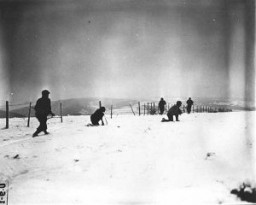
Learn more about the Auschwitz camp complex in German-occupied Poland. More than 1.1 million people died at Auschwitz, including nearly one million Jews.
The Auschwitz camp complex had more than 40 subcamps that brutally exploited prisoner labor. Learn more about these subcamps, including Althammer, Blechhammer, Budy, and Fürstengrube.
Children were especially vulnerable to Nazi persecution. Explore a series of articles about the plight of children during the Holocaust, including experiences in hiding.
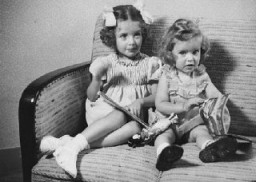
The creation of ghettos was a key step in the Nazi process of brutally separating, persecuting, and ultimately destroying Europe's Jews during the Holocaust. Learn more.
From 1933 to 1945, Nazi Germany carried out a campaign to "cleanse" German society of individuals viewed as biological threats to the nation's "health." Learn more
Series of articles about the history of discrimination against Roma in Europe and how the Nazi regime committed genocide against European Roma during WWII.
The trauma of WWI would profoundly shape the attitudes and actions of both leaders and ordinary people during the Holocaust. Learn more about the war and its aftermath.
Explore a rare photograph collection capturing a view of the Sephardic Jewish community of Monastir on the eve of its destruction during the Holocaust.
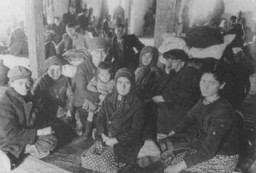
Explore key themes about the Olympic Games held in Berlin in 1936, including debates over participation in the Games, the choices facing African American athletes, and the role of Nazi propaganda.
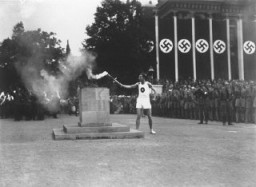
To carry out the "Final Solution," the Nazis established killing centers in German-annexed and occupied Poland. Learn more about these killing centers, also referred to as extermination camps or death camps.
The Nazis perpetrated mass murder against groups considered to be racial, civilizational, or ideological enemies. This included Soviet prisoners of war. Learn more
Holocaust denial is any attempt to negate the established facts of the Nazi genocide of European Jews. Explore the articles in this series to learn about Holocaust denial and its origins.
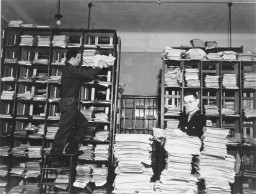
Nazi racial ideology has no basis in reality. Like other forms of racism, Nazi racism was rooted in prejudice. It was based on Adolf Hitler’s antisemitic, racist ideas. Learn more
Browse a series of articles about the establishment of the International Military Tribunal at Nuremberg and the larger context of postwar trials.
Learn about the history and causes of antisemitism (hatred of Jews) and its role in Nazi ideology.
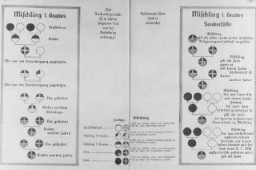
The Nazis took control of the police and turned Germany into a dictatorship; implemented a racist ideology; and carried out brutal policies across annexed and occupied Europe. Learn more.
Learn about Jewish life in Germany and Europe before WWII, antisemitic laws, and Nazi violence and discrimination against the Jews of Germany.
The Nazi “Final Solution to the Jewish Question” was the deliberate, planned mass murder of European Jews. Learn more about how the Nazis implemented the "Final Solution."
Learn about the history of the Nazi camp system, the different types of camps, who was imprisoned and why, and conditions in the camps.
Browse a series of articles describing how some Jews survived the Holocaust; rescue efforts; anti-Nazi resistance groups; and revolts against Nazi oppression in the Warsaw ghetto and in killing centers.
Learn about some of the Righteous Among the Nations, non-Jewish individuals who have been honored by Yad Vashem, Israel's Holocaust memorial, for risking their lives to aid Jews during the Holocaust.
Learn about the experiences of 6 Holocaust survivors whose journeys brought them to the United States: Thomas Buergenthal, Aron and Lisa Derman, Regina Gelb, Blanka Rothschild, and Norman Salsitz.
Learn more about resistance in some of the smaller ghettos of eastern Europe in the face of overwhelming odds and desperate scenarios.
With decrees, legislative acts, and case law, Nazi leadership gradually moved Germany from a democracy to a dictatorship. Learn more about law and justice in the Third Reich.
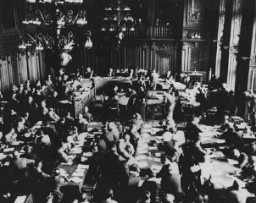
As Allied troops moved across Europe against Nazi Germany in 1944 and 1945, they encountered concentration camps, mass graves, and other sites of Nazi crimes. Learn more
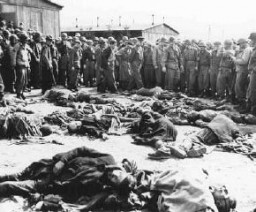
Explore key themes related to the end of the Holocaust, including liberation, challenges facing survivors, displaced persons camps, and postwar justice.
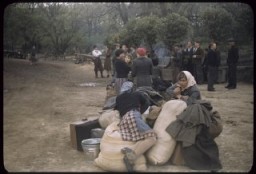
Explore key themes, concepts, and topics related to the history of the Holocaust. Learn about the Nazi persecution of Jews and the implementation of the "Final Solution."
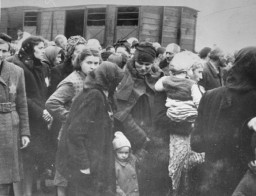
Jews were the primary targets for mass murder by the Nazis and their collaborators. Nazi policies also led to the brutalization and persecution of millions of others.
Despite the inaction of most Europeans and the collaboration of many in the persecution and murder of Jews, some individuals and networks from all social and religious backgrounds aided Jews. Learn more.
The Nazi rise to power marked the beginning of the Third Reich. Learn more about the Nazi state from its suspension of basic civil rights to the implementation of mass murder.
Explore a series of articles about the experiences of women during the Holocaust.
Explore some oral history testimony excerpts describing the experiences of women during the Holocaust.
Examine artifacts such as clothing and letters and explore the experiences of women during the Holocaust.
Learn about American women spanning a wide range of roles and activities or experiences during the Holocaust, from First Lady Eleanor Roosevelt to US Army nurse Pat Lynch.
Explore a series of articles about the role of German women in the Nazi movement.
Explore articles about the voyage of the German transatlantic liner St. Louis in May-June 1939. Most of the ship's passengers were Jews fleeing Nazi Germany.
Explore a series of articles about diaries and journals kept during the Holocaust. Each diary reflects a fragment of its author's life.
Germany’s policemen played a key role in the consolidation of Nazi power. During WWII, their role became radicalized. Learn about police in Germany before and after the Nazi rise to power.
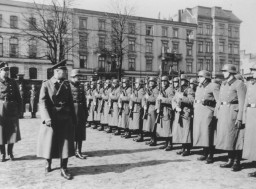
During the Holocaust, Nazi leaders required the active help or cooperation of professionals ranging from civil servants, lawyers, doctors, teachers, police, members of the military, business elites, to church leaders. Learn more.
In October 1945, the chief prosecutors of the International Military Trial brought charges against 24 leading German officials. Learn more about who was put on trial.
We would like to thank Crown Family Philanthropies, Abe and Ida Cooper Foundation, the Claims Conference, EVZ, and BMF for supporting the ongoing work to create content and resources for the Holocaust Encyclopedia. View the list of donor acknowledgement.